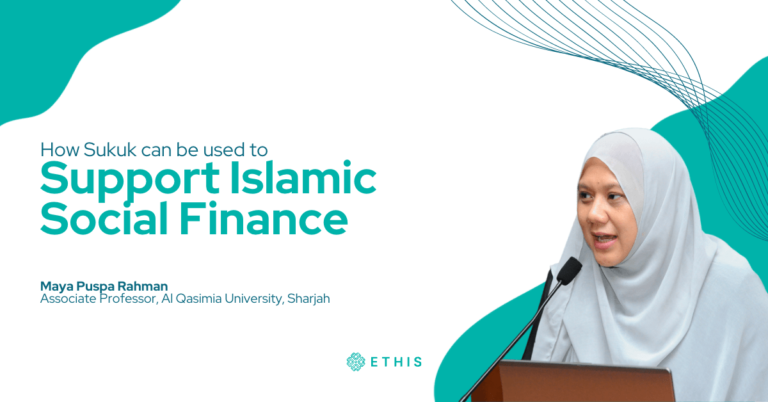
By Maya Puspa Rahman, Associate Professor, Al Qasimia University, Sharjah
Whenever the topic of Islamic social finance is brought up, zakat and waqf often come to mind. It is no surprise since these two sources of funds are often associated with social welfare supporting the well-being of Muslim communities.
Nonetheless, the respective nature of zakat and waqf inherited from its collection and distribution policies have somehow limited its use for funding big and sustainable development projects in Muslim countries thus far. As such, more focus has been placed on the next best alternative to Islamic banking for sourcing the funds, which is Sukuk.
Related: “Sukuk” A Driving Force in the Development of Islamic Finance
Sukuk often termed the “Islamic bond” has been around for more than three decades since its first issuance in 1990 by one of the leading international petroleum companies, Shell (Malaysia) Berhad. Many scholars refuse to use the word “bond” as it directly reflects borrowing money from the lender and prefers to call it Sukuk (a plural of sakk which means a certificate in the Arabic language) as it represents equity ownership or investment document of the underlying assets or projects with details on the flow of future income to its Sukuk holders.
Given that the Sukuk market has developed quite impressively over the years, it has been regarded as the preferred source of capital for development funding by the government and corporations around the world. Therefore, even during the pandemic of COVID-19, the issuance of Sukuk reached a high value amounting to US$174.6 billion in 2020.
Supporting social finance


When examining Sukuk issuance over the years, one sees more focus placed on sustainability and environmental issues though it also involves investment activities that would generate financial returns for investors. Thus Sukuk can play an important role in supporting social finance.
The fact that countries like Malaysia and other emerging economies around the world are relying more on public-private partnerships (PPP) in funding development projects mainly related to health and education, means that the use of Sukuk is well suited to these areas.
After the issuance of socially responsible investment (SRI) Sukuk ihsan to build schools in Malaysia by Khazanah National Berhad in 2015, recent times saw more renewable energy and environmental-friendly projects leading to a series of green Sukuk issuance.



Malaysia has been hailed as the market leader here with the inaugural issuance of green Sukuk worth US$250 million for the construction of a solar energy platform for a clean and sustainable power supply by Tadau Energy Sdn Bhd in 2017.
A year later, in 2018, Indonesia issued the world’s first sovereign green Sukuk amounting to US$1.25 billion aimed at achieving its national emission reduction goals by 2030. The issuance of US$600 million Sukuk by Etihad Airways for the transition of the airline towards zero carbon emissions and the US$1.3 billion by Saudi Electricity Company in 2020 also marked the additional new green Sukuk in the market.
Joining the force is the Islamic Development Bank (IDB) with the issuance of the world’s first AAA-rated sustainable development goals (SDG), specifically for funding projects related to good health and sustainable economic growth in the same year. As of July 2020, up to US$6.1 billion had been raised through twelve unique green Sukuk issuers mainly from Malaysia, Indonesia and the United Arab Emirates (World Bank).
Related: Critical Shariah Issues Related to Sukuk Guarantees
Later in September 2020, RM500 million Malaysia Sukuk Prihatin was issued by the government of Malaysia aimed solely for the societal cause providing the opportunity for the public to participate and contribute to the rebuilding of the nation post-COVID-19. And more recently in March 2021, ISDB issued another US$2.5 billion AAA-rated sustainability Sukuk to be allocated for green financing and social development projects. This issuance also marked the largest Sukuk ever issued and ISDB’s biggest USD public issuance to date.
Major challenges in Sukuk


Despite these remarkable achievements, issuing Sukuk for social and environmental purposes is not without challenges. Among the many issues in structuring social, green, or sustainable Sukuk are the underlying asset and the type of contracts that should be used. For example, the ijarah structure may not have any issues inherent in the debt structure but meticulous attention is needed on the basis used for determining the profit or rental payments and the redemption amount on the principal.
Apart from that, in consideration that these projects are more of a societal impact in nature, it would raise marginally higher review and reporting costs as there is a need for a professional benchmark and measurable impact on the societal issues.
In conclusion, Sukuk has progressed extremely well in supporting Islamic social finance. The current challenges regarding the structure and monitoring mechanism can be refined further with the dedication of all stakeholders. Given the global access of the Sukuk market, its continuous use for societal causes would be able to ensure long-term social improvements and resilience towards sustainable growth that could provide even greater benefit for all levels of society.





Top Posts
Islamic P2P Crowdfunding Explained
Halal Money Matters: How Muslims Can Balance Deen and Dunya with Smart Islamic Finance
Halal Investments for Singapore Muslims? It’s time for a shake-up in the Islamic Investments scene.
Smart investment for making Halal money
3 Reasons Why Property Crowdfunding is the Smart Investment for You